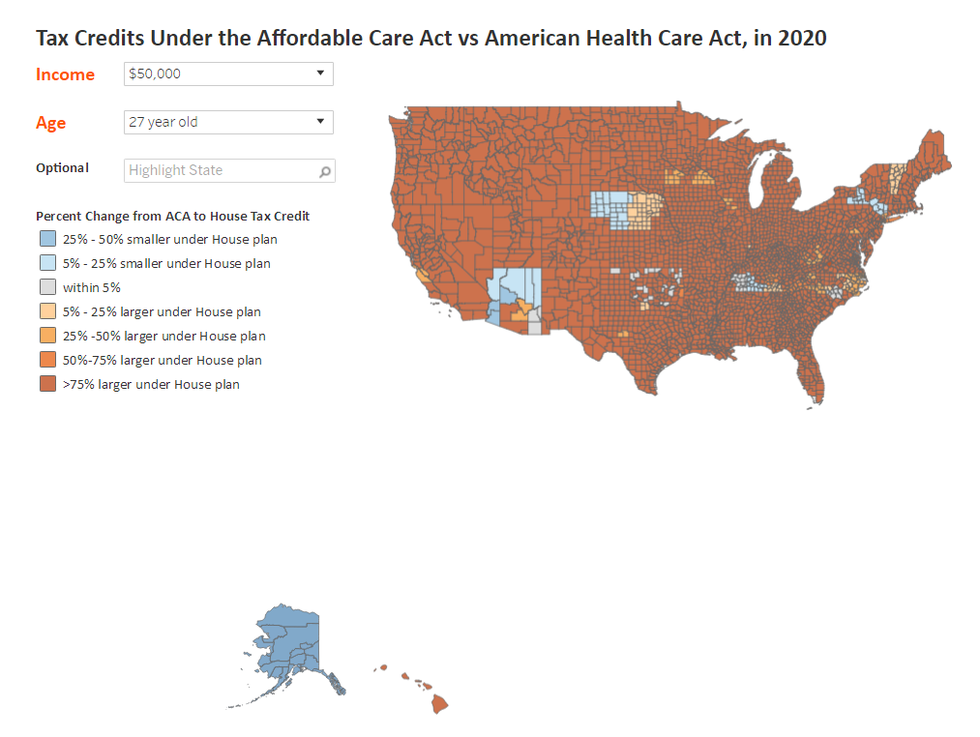On March 6th, Speaker of the House Paul Ryan unveiled the much-anticipated GOP replacement to the Affordable Care Act. With rising premiums and sky-high deductibles that made it hard for low-income families to use the at-times very limited coverage, something was going to have to be done. The course of action, however, was highly dependent on the outcome of the election, at the national and state levels, and we all know how that went.
Which brings us to now: The American Healthcare Act.
Here are some of the basics: the replacement eliminates the individual mandate, arguably the most controversial feature of Obamacare because it required everyone to be insured in some manner or other. On his first day in office, Trump took steps to weaken this aspect of the ACA. The bill keeps some of the more popular provisions of Obamacare like the mandates preventing insurance companies from refusing coverage to people with pre-existing conditions and allowing people to stay on their parents' coverage until they're 26. It also continues with the Medicaid expansion, started under the Affordable Care Act, through January 2020. As noted by Sarah Kliff at Vox, in more ways than one, the American Healthcare Act looks a lot like Obamacare.
There are, on the other hand, some key differences.
Obamacare Lite, as the healthcare replacement act has been "affectionately" dubbed by conservatives like Paul Ryan and Thomas Massie, features expands the tax credits feature of Obamacare- more commonly referred to as subsidies in the ACA- and focuses on age and income, with a phase-out option for high-earners. For recent college grads, whose average starting income with a bachelor's degree is roughly $50, 600. Trumpcare actually increases the tax credit they'd be receiving towards their insurance. In fact, a lot of middle-class could see a rise in coverage with this healthcare act as it expands the subsidies to people earning different incomes who wouldn't have been covered under Obamacare.
But there are major problems with the Trumpcare that need to be answered for. Illegal immigrants will have an easier time accessing the healthcare provided in the AHCA than under Obamacare, as Obamacare at least allowed companies to check immigration status against Social Security numbers. And a 30% penalty comes into play if you don't initially buy insurance but decide later on you'd like to. There's also several provisions that indicate that companies will be able to price seniors, who tend to be a more expensive group in terms of healthcare coverage, right out of the market.As many people are celebrating this bill as are attacking it.
Frankly, I don't think it's a smart decision to continue with the failures of Obamacare. As Andrew Klavan aptly points out, we have to remember what the entire game of health insurance is: it's the cold bet of you paying for coverage on the assumption that you will become sick and companies gambling that you will stay healthy long enough for them to profit. While forcing companies to cover sick people sounds nice, it's not necessarily the most economically sound thing to do. Republicans had 8 years to write and prepare a replacement package for the Affordable Care Act they so despised. Under pressure to act quickly and repeal it, Obamacare Lite was born. Honestly, if this was the best they could do, I'm more than a little disappointed. We'll have to wait and see what drafts and plans come now but in any case,
Good luck, America.







 Energetic dance performance under the spotlight.
Energetic dance performance under the spotlight. Taylor Swift in a purple coat, captivating the crowd on stage.
Taylor Swift in a purple coat, captivating the crowd on stage. Taylor Swift shines on stage in a sparkling outfit and boots.
Taylor Swift shines on stage in a sparkling outfit and boots. Taylor Swift and Phoebe Bridgers sharing a joyful duet on stage.
Taylor Swift and Phoebe Bridgers sharing a joyful duet on stage.













